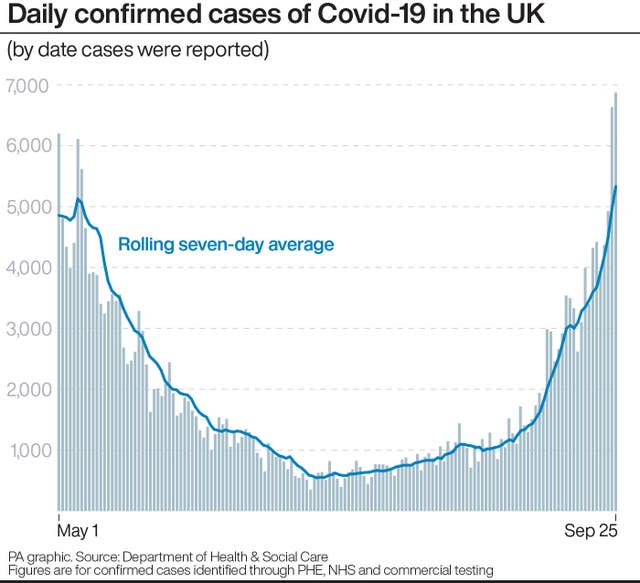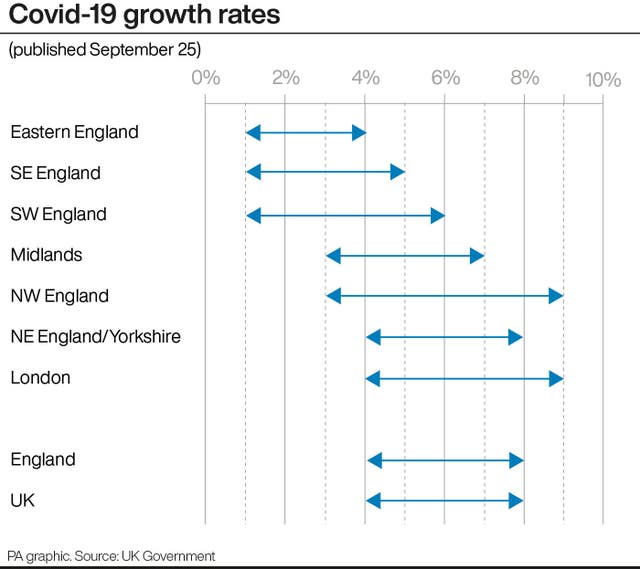Household mixing ban comes into force across swathes of northern England
Judith Blake, the leader of Leeds city council, warned there was ‘a lot of confusion’ and ‘a lack of clarity’ about the new measures.

Bans on households mixing have come into force across swathes of northern England amid a warning that the new measures may not be enough to halt the spread of coronavirus.
Extra restrictions were introduced at midnight in Wigan, Stockport, Blackpool and Leeds, with residents advised not to meet people outside their household or bubble in any setting.
Tougher rules are already in force across large swathes of north-west England, West Yorkshire, the North East and the Midlands, as well as parts of west Scotland.
A ban on households mixing indoors was extended across Northern Ireland earlier this week.
Cardiff and Swansea will go into local lockdown from 6pm on Sunday. People will not be able to enter or leave the areas without a reasonable excuse. They will not be able to meet indoors with anyone they do not live with, with extended households suspended.
The total number of people set to be living under stricter rules will rise to 17 million – more than a quarter of the UK population.
Judith Blake, the leader of Leeds city council, warned that there was “a lot of confusion” and “a lack of clarity” about the new measures in the city.
She told BBC Breakfast: “We know that the restrictions themselves won’t just work on their own, it has to come as part of a whole raft of measures in the city.

“The important message that we know from other areas is there is a lot of confusion, a lack of clarity, particularly in areas where there are different rules in one borough and the next-door borough has another one. This has to be a wake-up call to people.
“If things carry on the way they are, then I can’t see how the Government won’t be forced to take more measures that have more of an impact on our lives, on our ability to go out and do the things we need to do to keep the economy going.”
Welsh Health Minister Vaughan Gething said the situation was comparable to the end of February, where “we ended large parts of NHS activity about two weeks later, we were in full lockdown three and a bit weeks later”.
He added: “We have seen a sharp rise in cases in all of the areas where we are taking local restrictions and it is being driven by indoor household contact, so more people than should be in that household bubble going in and mixing.

“That has extended out into licensed premises as well, where again people are not following the rules.”
Despite the new national restrictions announced by the Government this week, infectious disease modelling expert Professor Graham Medley warned there would be 100 coronavirus deaths a day in a few weeks’ time.
Prof Medley, who attends meetings of the Scientific Advisory Group for Emergencies (Sage), told BBC Radio 4’s Today programme: “At a level of 10,000 (cases) we are seeing now, means that in three or four weeks we are going to see 100 deaths a day.
“In order to stop that process increasing again, then we need to make sure that that transmission comes down now because that doubling time will carry on. The things that we do now will not stop 100 people dying a day but they will stop that progressing much higher.”
He also said he had “never heard” the 10pm curfew for hospitality discussed during Sage meetings.
Elsewhere, hundreds of students in Manchester have been told to self-isolate after 127 of them tested positive for coronavirus.
Residents at the Birley campus and Cambridge Halls at Manchester Metropolitan University have been told to stay in their rooms for 14 days, even if they have no symptoms.
In total, 1,700 students have been locked down, according to the Manchester Evening News.
Hundreds of students are also self-isolating after outbreaks of the virus at Glasgow, Edinburgh Napier and other universities.
There were a further 6,042 lab-confirmed cases of coronavirus in the UK as of 9am on Saturday, taking the overall number to 429,277. It is a slight decrease from 6,874 on Friday.
The Government also said a further 34 people had died within 28 days of testing positive for Covid-19 as of Saturday. This brings the UK total to 41,971.
Separate figures published by the UK’s statistics agencies show there have been 57,600 deaths registered in the UK where Covid-19 was mentioned on the death certificate.





